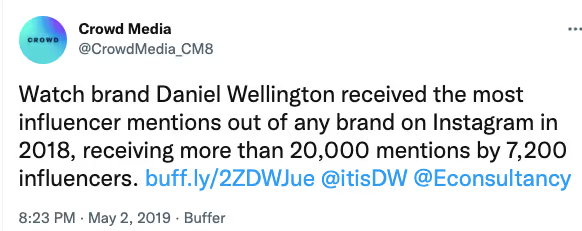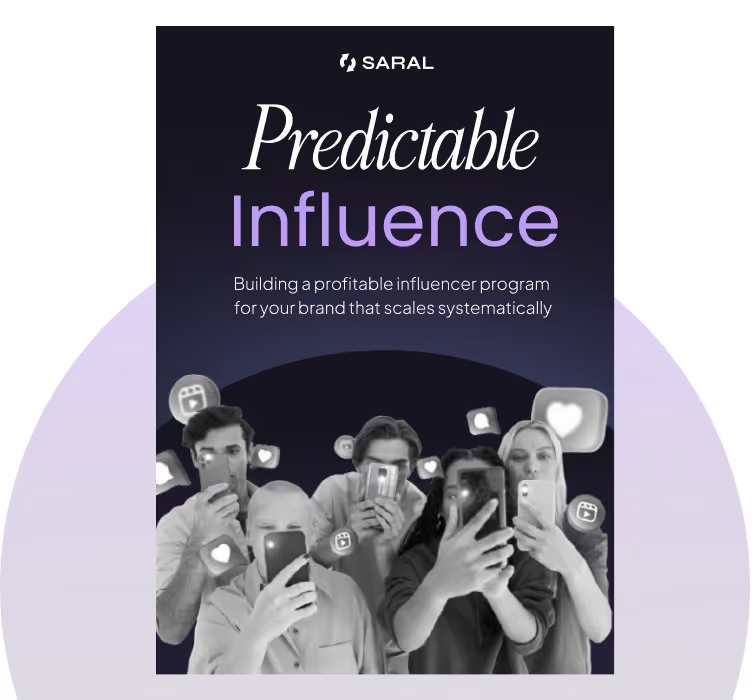Ready to drive incremental growth with influencers?
If ditching the randomness of influencer campaigns and building a predictable, ROI-first influencer program sounds like a plan. Consider talking to our team!

Forensics
Learn how Daniel Wellington built a $230M watch empire using influencer marketing strategies like product seeding & ambassador programs.
Contents
In 2006, Filip Tysander, a Swedish guy, traveled across Australia when he met a stylish English gentleman. That man was fond of vintage watches & wore them with old NATO straps. The style was impeccable but understated, which impressed Filip.
After coming to Sweden, he put a couple of thousands of dollars into starting a company making elegant, minimalistic watches with interchangeable straps. He named the brand after the man who inspired him: Daniel Wellington.
Since its inception in 2011, the company has sold over 6 million watches in 25 countries worldwide. Their Instagram account has an impressive number of followers — 4.8M as of Aug 2022.

The hashtag #danielwellington has 166M+ views on TikTok & 2,429,989 posts on Instagram.
Even if you want to watch the last 4 days of the full history of the hashtag, you will have to keep scrolling non-stop for a couple of minutes.

Their watches are being donned by models & stars such as Hailey Beiber, Selena Gomez, and Korean dreamboat Lee Jong Suk.
Filip Tysander has a background in marketing, so it's not a surprise that the brand Daniel Wellington had a good marketing strategy that contributed to its success. But influencer marketing, in particular, was the centerpiece of their marketing. They utilized the power of many "small" celebrities rather than ultra-popular names that watch brands like Rolex are used to doing.
In fact, in 2018 here's what happened —

To show you how impressive that is, here's another fact — Popular brands like Nike and Sephora received less than 10% of that number!
In 2017 when influencer marketing was picking up, DW was already partnering with thousands of influencers. The success of this influencer marketing strategy, instead of pumping money into ads like every other brand, helped them stay bootstrapped and were under no pressure to raise VC money.

Influencer Product Seeding/Gifting means sending free products to influencers in the hope that they will post about your product, share their reviews & drive brand awareness plus social proof.
Daniel Wellington started influencer marketing by product seeding with nano-influencers before moving to a paid-partnership model with more prominent influencers. They would ask influencers to post pictures of them wearing a watch using the branded hashtag #danielwellington.
The after-effect of this was an explosion of photos with branded hashtags, a boom in sales, and Daniel Wellington becoming a leader in the lifestyle brand category. When many influencers were given creative freedom, fresh and engaging content emerged.
This usually works with nano-influencers (creators with less than 20k followers) because posting on social media or brand collaborations is not their full-time pursuit. Hence, they are more likely to agree to free products instead of monetary benefits.
Authentic, high-converting UGC doesn’t have to come with a hefty price tag. This FREE EBOOK shares proven strategies to source influencer content that feels real and drives results—without overspending.
To maximize the influencer marketing ROI, DW repurposed influencer content on their own social media and even on their website as product images.
Here's a script you can use to get usage rights (usage rights define who owns the content and where it can be used) for the video/post:
“Hey {first_name},
We're so glad you loved our gift. Thank you for sharing it in your story.
We'd love to be able to share this with our audiences as well! Could we have the right to use this content on organic and paid social sites for 30 days?
Thank you.
Mixing product gifting and getting authentic influencer UGC as a strategy was pioneered by DW but is now perfected by multiple eCommerce brands. This is one of the cheapest (almost free apart from the cost of the product) to get free ad creatives, product images, or social media photos generated at scale.
Here's an influencer post talking about DW watch:

The post was later used on the DW's website

Here's a post made by an influencer wearing DW watch on Instagram

The brand used the same for their feed with a catchy caption.

"But, manually requesting content from every creator, asking for usage rights, and managing the content of tens and hundreds of influencers sounds like a soul-draining task".
If this is you, do not worry. This is where SARAL can help you. You can use SARAL's Social Listening engine to track and collect influencer UGC, request rights, and download content. No more manual screenshotting and tracking posts. SARAL listens when your influencers post and auto-tracks the content.
You can request for UGC rights right within the platform, download content, and re-purpose it to maximize impact. Try it out for yourself here.

Every influencer that promotes any of DW's products gets a unique promo code for their audience.
This has three benefits:
Apart from the personalized code, every influencer probably gets a good brand guideline brief on the campaign and essential information to include in the post.
We could see every post of their SUMMER campaign had a campaign name, collection name, full offer with discounts, freebies, etc.


Apart from running random promotional campaigns throughout the year, DW collaborates with influencers around the times when there's a high probability of someone buying their watch as a gift for someone — special events and holidays like BFCM, Valentine's Day, Mother's Day, etc.
The perfect excuse to buy a DW item coupled with social proof from a influencer that people look up to and topped with a discount is a great way to boost sales and a strategy worth stealing for your brand.
Here's an example of a post from a creator promoting DW's watch during Valentine's Day:

DW has a dedicated influencer landing page that invites people to become brand ambassadors.

The top of the page is optimized to get someone registered as an ambassador with repeating CTAs, a strong mission statement, and a stylish image.
The second half of the page talks about perks & some FAQs but not in much detail.
Other brands like Athletic Greens and Snif do a much better job of outlining an influencer or ambassador program on their landing pages.

As per the LinkedIn search, we can see 9 people in the Influencer marketing team. The global Head of Influencer Marketing probably heads the department. Then there are regional Influencer Marketing managers, Coordinators, and even freelancing consultants to help run the operations.

Now, after more than a decade of growth and collaborations with nano-influencers, micro-influencers, and macro influencers, DW is working with global icons around the world to promote their brand & new collection 'Link.'
Onboard, they have model Hailey Bieber and NFL player Odell Beckham Jr. from the US.; singer-songwriter Lay Zhang from China; model and actress Lee Sung Kyung from South Korea; Bollywood stars Ayushmann Khurrana and Radhika Apte from India; and Argentine soccer player Paulo Dybala, who is popular with the European audience.
"We picked seven different icons that we think stand for great things that we want to talk about. Some of the other faces are very locally relevant. We're not picking one face that tries to represent the entire world—together, they do it, but of course, we want to show that we are a watch that's great for people in India, the US, China, and Sweden as well."
says a spokesperson from the brand in an interview with Forbes. (source)
In summary, Daniel Wellington’s innovative influencer marketing strategy showcases the power of authentic partnerships and creative content in building a global brand.
By leveraging nano-influencers, repurposing genuine user content, and integrating personalized promo codes, DW not only amplified its reach but also fostered a loyal community. This approach serves as a compelling blueprint for modern brands aiming to achieve sustainable growth in the digital landscape.
If you wish to build a similar and a successful ambassador program without focusing on the boring, mindless, and the soul-draining tasks of influencer marketing, then SARAL can help you do it.
SARAL is an all-in-one influencer marketing platform excels at what matters most:
...and so much more so you can focus on things that can't be automated, like building relationships.

We handle the time-consuming grunt work so you can focus on strategic decisions, building relationships with influencers, and more.
Book a personalized demo and we'll walk you through exactly how to make your campaigns run smoother, faster, and better.

Sign up for a 7-day email course on the unique "Predictable Influence" strategy used by top brands like Grüns, Obvi, Tabs Chocolate.

With these 10 time-tested influencer marketing tactics from top brands including Olipop, Athletic Greens, lululemon, and Hexclad, you will find actionable strategies to implement. Whether you're building or looking to improve your influencer campaigns, these lessons will provide a roadmap for your influencer marketing success.

If ditching the randomness of influencer campaigns and building a predictable, ROI-first influencer program sounds like a plan. Consider talking to our team!